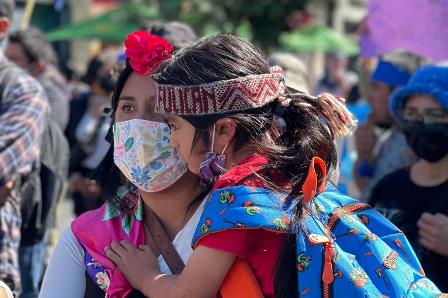Colonial capitalism, Mapuche social suffering and political participation. The role of Mapuzungun and the boundaries of the colonial public sphere.
DOI:
https://doi.org/10.5281/zenodo.6914371Keywords:
Colonial violence, social suffering, mapucheAbstract
The purpose of this article is to explore the role of Mapuche contextualized discursive practices and the role of Mapuzungun as a source of knowledge, wisdom and transgenerational memories that facilitate the development of social practices of reciprocity, and to understand how a language subalternized by a history of racist violence, reveals how such practices are severely obstructed when they are articulated in the public sphere, both in the expression of the suffering experienced, as well as in the vindication of demands against colonial capitalism. We situate this discussion in the context of the current process of political receptiveness to new ways of conceiving the state in Chile, as a response to the diverse demands for justice among different political communities. We address both the dilemmas of capitalism and colonial enterprise in the Latin American Southern Cone, as well as the debate on Mapuche social welfare and suffering in the face of colonial violence.
Downloads
References
BARÓ, Ignacio Martín (1988). La violencia política y la guerra como causas del trauma psicosocial en El Salvador. Revista de psicología de El Salvador Vol. 7 Nº 28, pp. 123-141.
BUTLER, Judith (2006). Vida precaria. El poder del duelo y la violencia. Buenos Aires: Paidós.
CALBUCURA, Jorge (1996). Legal process of abolition of collective property: The Mapuche case. The Steel Crown, Vol. 3, pp. 3-16.
CANALES, Pedro (1998). Escuelas Chilenas en Contextos Mapuche. Integración y resistencia, 1860-1950. Última Década, Vol. 6 nº 9, pp. 3-18.
CARRASCO, Hugo (2002). El discurso público mapuche: noción, tipos discursivos e hibridez. Estudios filológicos, Vol. 37, pp. 185-197.
CATRILEO, María (2014). El Ngillatun como sistema conceptual mapuche. Estudios filológicos, Vol. 53, pp. 27-38.
COULTHARD, Glen (2014). Red Skin, White Masks: Rejecting the Colonial Politics of Recognition. University of Minnesota Press: Minneapolis.
FRASER, Nancy y HONNETH, Axel (2003). Redistribution or Recognition?. A Political-Philosophical Exchange. Verso: Nueva York/Londres.
FRASER, Nancy y JAEGGI, Rahel (2019). Capitalism: A conversation in critical theory. John Wiley & Sons.
GOLLUSCIO, Lucía (2006). El pueblo mapuche: poéticas de pertenencia y devenir: Editorial Biblos: Buenos Aires.
GROSFOGUEL, Ramón (2018). La compleja relación entre modernidad y capitalismo: una visión descolonial. Pléyade (Santiago), Vol. 21, pp. 29-47.
HONNETH, Axel (2014). El derecho de la libertad: esbozo de una eticidad democrática. Katz editores.
HUENCHUCOY, Luz (2015). Tesis para optar al grado de Magíster en Trabajo Social Familia, Políticas Públicas e Interculturalidad de la Universidad Católica de Temuco. ‘Epu xoy kvmvn; Tuwvn ka kvpalme Trabajo Social mu’. Dos miradas del saber; tuwvn y kvpalme en el Trabajo Social “Epu leling kvmvn; Tuwvn y kvpalme Trabajo Social mu”. Dos miradas del saber; tuwvn y kvpalme en el Trabajo Social. Docente Guia Dr. Ricardo Salas Astraìn.
MACADOO, Andrés y PAUCHARD, Paulina. (2021). La contribución de la psicología en la teoría social crítica: Axel Honneth y Emmanuel Renault. Revista Stultifera, vol. 4, nº 1, pp. 39-64.
MARIMAN, José (2021). Encrucijada de futuro en tiempos de rebelión y pandemia: pluralismo nacional y autogobierno indígena en Chile. En Autonomías y autogobierno en la América diversa, (Coord) Gonzalez, M., Burguete, A., Mariman, J., Ortiz, P. y Funaki R. Ediciones Abya Yala: Cuenca.
MARIMAN, Pablo (2017). La geoestrategia en el conflicto chileno mapuche: la configuración del Estado Nación (1830-1869). Anales de la Universidad de Chile nº 13, pp. 39-57.
MITCHELL, Terry (2017). Colonial trauma and political pathways to healing. En S. L. Stewart, R. Moodley, y A. Hyatt (eds) Indigenous cultures and mental health counselling: Four directions for integration with counselling psychology. Routledge/Taylor & Francis Group.
ÑANCULEF, Ana y CAYUPÁN, Cristian (2016). Kuifikezugu. Discursos, relatos y oraciones rituales en mapuzungun. Temuco: Comarca Ediciones.
PAINEQUEO, Hector y QUINTRILEO, Elizabeth (2015). Algunas causas que podrían estar incidiendo en el eventual debilitamiento de la vitalidad y posible desplazamiento de la lengua mapuche por el castellano en Chile. Onomázein: Revista de lingüística, filología y traducción de la Pontificia Universidad Católica de Chile Vol. 31, pp. 205-218.
PAIRICAN, Fernando (2021). Los horizontes autonomistas del movimiento mapuche. Nueva Sociedad, Vol. 295, pp. 136-148.
PEDRERO, M y OYARCE, A. M. (2009). Una metodología innovadora para la caracterización de la situación de salud de las poblaciones indígenas de Chile: limitaciones y potencialidades. CEPAL Vol. 89, pp. 119-146.
RENAULT, Emmanuel (2008). Souffrances sociales: Philosophie, psychologie et politique. La Découverte.
RENAULT, Emmanuel (2017). Reconnaissance, conflit, domination. Cnrs.
TOLEDO, Victor (2006). Pueblo Mapuche Derechos Colectivos y Territorio: Desafíos para la sustentabilidad democrática. LOM ediciones: Santiago.
WOLFE, Patrick (1999). Settler Colonialism and the Transformation of Anthropology. Cassell: Nueva York.

Downloads
Published
Issue
Section
License

This work is licensed under a Creative Commons Attribution-NonCommercial-ShareAlike 4.0 International License.

